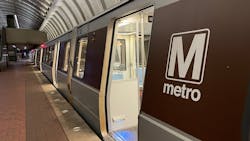WMATA Board locks in service improvements, fare discounts in approved $4.5 billion budget
A $4.5-billion package of service and construction projects was approved by the Washington Metropolitan Area Transit Authority (WMATA) Board of Directors.
The package delivers affordability, service and safety as part of the Fiscal Year 2023 (FY23) budget. Highlights include reducing late-night and weekend fares, maintaining service improvements especially for bus customers and funding for the Silver Line Phase 2 service and the Potomac Yard Station. The budget also funds WMATA’s capital program which has improved safety and reliability across the system.
The budget supports the region’s economic recovery from the pandemic and provides more flexibility to customers that may no longer be commuting to work five days a week. Popular fare discounts implemented in 2021 will become permanent to keep WMATA affordable as well as provide more frequent all-day service on bus and rail.
“This budget supports the service our customers need now, while promoting Metro as the convenient, affordable transportation of choice as the region looks beyond the pandemic,” said WMATA Board Chair Paul C. Smedberg. “The fare and service improvements recognize Metro’s integral role in the region’s economy and the need to adapt to changes in work and daily activities.”
WMATA’s capital program in FY23 continues investments in safety and reliability. This summer the multi-year platform reconstruction effort at 20 outdoor rail stations will conclude. Major rehabilitation projects also will get underway on the Yellow Line to address decades of water infiltration and erosion of the steel-lined tunnels and deterioration of the bridge crossing the Potomac River.
“It is critical that we continue to invest in infrastructure improvements and rehabilitation of Metro’s aging tracks, tunnels and aerial structures,” said WMATA General Manager Paul J. Wiedefeld. “We appreciate the funding and support of our local, state and federal elected officials, businesses and customers, as this work continues to renew and make safer the regional assets in our nation’s capital.”
The service and fare changes will go into effect on or about July 1, 2022, the start of the next fiscal year. Highlights of the budget are as follows.
Lower fares, discounted passes
Makes several fare changes that started in 2021 permanent:
- Free bus fares on any regular Metrobus route when transferring to/from rail with $2 transfer discount.
- Cheaper weekend one-way Metrorail fares: $2 for any one-way trip all weekend.
- Cheaper seven-day regional bus passes: seven-day regional bus pass for $12 and a senior/ disabled pass for $6.
New fare improvements:
- Cheaper late-night Metrorail fares: $2 for any one-way trip after 9:30 p.m.
- Cheaper monthly unlimited passes. Metrorail and Metrobus Unlimited Passes would cost $64-$192 instead of $72-$216 (Price varies by distance and is based on 32 trips rather than 36 trips per month).
New fare promotion to last up to six months (Dates to be determined):
- Fifty percent off the seven-Day Unlimited Pass: Ride unlimited Metrorail and Metrobus for a week for $29.
More frequent bus and rail service
Makes service improvements that started in 2021 permanent:
- Frequent bus service network with buses scheduled every 12 or 20 minutes on 36 of the most popular Metrobus lines.
- Increased service on 22 bus routes to address crowding.
- Restored service to pre-pandemic levels on selected bus lines.
- Improved all-day train frequencies during weekday peak and off-peak hours.
- Improved late-night train frequencies after 9:30 p.m. seven days per week.
- Improved all-day weekend train frequencies on all lines.
- Support launch of rail service to seven new stations (Silver Line Phase 2 and Potomac Yard)
Note: Due to the ongoing 7000-series railcar investigation, service improvements would go into effect after 7000-series railcars return to service.


